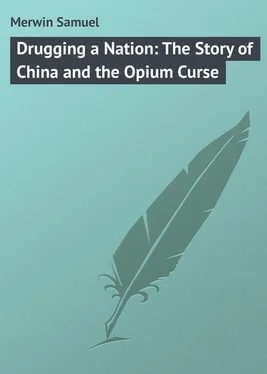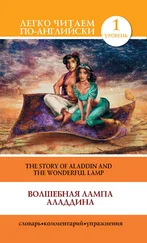Samuel Merwin - Drugging a Nation - The Story of China and the Opium Curse
Здесь есть возможность читать онлайн «Samuel Merwin - Drugging a Nation - The Story of China and the Opium Curse» — ознакомительный отрывок электронной книги совершенно бесплатно, а после прочтения отрывка купить полную версию. В некоторых случаях можно слушать аудио, скачать через торрент в формате fb2 и присутствует краткое содержание. Жанр: foreign_prose, на английском языке. Описание произведения, (предисловие) а так же отзывы посетителей доступны на портале библиотеки ЛибКат.
- Название:Drugging a Nation: The Story of China and the Opium Curse
- Автор:
- Жанр:
- Год:неизвестен
- ISBN:нет данных
- Рейтинг книги:5 / 5. Голосов: 1
-
Избранное:Добавить в избранное
- Отзывы:
-
Ваша оценка:
- 100
- 1
- 2
- 3
- 4
- 5
Drugging a Nation: The Story of China and the Opium Curse: краткое содержание, описание и аннотация
Предлагаем к чтению аннотацию, описание, краткое содержание или предисловие (зависит от того, что написал сам автор книги «Drugging a Nation: The Story of China and the Opium Curse»). Если вы не нашли необходимую информацию о книге — напишите в комментариях, мы постараемся отыскать её.
Drugging a Nation: The Story of China and the Opium Curse — читать онлайн ознакомительный отрывок
Ниже представлен текст книги, разбитый по страницам. Система сохранения места последней прочитанной страницы, позволяет с удобством читать онлайн бесплатно книгу «Drugging a Nation: The Story of China and the Opium Curse», без необходимости каждый раз заново искать на чём Вы остановились. Поставьте закладку, и сможете в любой момент перейти на страницу, на которой закончили чтение.
Интервал:
Закладка:
Merwin Samuel
Drugging a Nation: The Story of China and the Opium Curse
NOTE
These chapters were originally published during 1907 and 1908 in Success Magazine . Though frankly journalistic in tone, the book presents something more than the hasty conclusions of a journalist. During its preparation the author travelled around the world, inquiring into the problem at first hand in China and in England, reading all available printed matter which seemed to bear in any way on the subject, and interviewing several hundred gentlemen who have had special opportunities to study the problem from various standpoints. The writing was not begun until this preliminary work was completed and the natural conclusions had become convictions in the author’s mind.
I
CHINA’S PREDICAMENT
In September, 1906, an edict was issued from the Imperial Court at Peking which states China’s predicament with naïveté and vigour.
“The cultivation of the poppy,” runs the edict, in the authorized translation, “is the greatest iniquity in agriculture, and the provinces of Szechuen, Shensi, Kansu, Yunnan, Kweichow, Shansi, and Kanghuai abound in its product, which, in fact, is found everywhere. Now that it is decided to abandon opium smoking within ten years, the limiting of this cultivation should be taken as a fundamental step … opium has been in use so long by the people that nearly three-tenths or four-tenths of them are smokers.”
“Three-tenths or four-tenths” of the Chinese people, – one hundred and fifty million opium-smokers – mean three or four times the population of Great Britain, a good many more than the population of the United States!
The Chinese are notoriously inexact in statistical matters. The officials who drew up the edict probably wished to convey the impression that the situation is really grave, and employed this form of statement in order to give force to the document. No accurate estimate of the number of opium victims in China is obtainable; but it is possible to combine the impressions which have been set down by reliable observers in different parts of the “Middle Kingdom,” and thus to arrive at a fair, general impression of the truth. The following, for example, from Mr. Alexander Hosie, the commercial attaché to the British legation at Peking, should carry weight. He is reporting on conditions in Szechuen Province:
“I am well within the mark when I say that in the cities fifty per cent. of the males and twenty per cent. of the females smoke opium, and that in the country the percentage is not less than twenty-five for men and five per cent. for women.” There are about forty-two million people in Szechuen Province; and they not only raise and consume a very great quantity of opium, they also send about twenty thousand tons down the Yangtse River every year for use in other provinces. The report of other travellers, merchants, and official investigators indicate that about all of the richest soil in Szechuen is given over to poppy cultivation, and that the labouring classes show a noticeable decline of late in physique and capacity for work.
In regard to another so-called “opium province,” Yunnan, we have the following statement: “I saw practically the whole population given over to its abuse. The ravages it is making in men, women, and children are deplorable… I was quite able to realize that any one who had seen the wild abuse of opium in Yunnan would have a wild abhorrence of it.”
In later chapters we shall go into the matter more at length. Here let me add to these statements merely a few typical scraps of information, selected from a bundle of note-books full of records of chats and interviews with travellers of almost every nationality and of almost every station in life. The secretary of a life insurance company which does a considerable business up and down the coast told me that, roughly, fifty per cent of the Chinese who apply for insurance are opium-smokers. Another bit comes from a man who lived for several years in an inland city of a quarter of a million inhabitants. The local Anti-opium League had 750 members, he said and he believed that about every other man in the city was a smoker. “It is practically a case of everybody smoking,” he concluded.
Twenty-five years ago, when the consumption of opium in China could hardly have been more than half what it is to-day, a British consul estimated the proportion of smokers in the region he had visited as follows: “Labourers and small farmers, ten per cent.; small shopkeepers, twenty per cent.; soldiers, thirty per cent.; merchants, eighty per cent.; officials and their staff, ninety per cent.; actors, prostitutes, vagrants, thieves, ninety-five per cent.” The labourers and farmers, the real strength of China, as of every other land, had not yet been overwhelmed – but they were going under, even then. The most startling news to-day is from these lower classes, even from the country villages, the last to give way. Dr. Parker, the American Methodist missionary at Shanghai, informed me that reports to this effect were coming in steadily from up country; and during my own journey I heard the same bad news almost everywhere along a route which measured, before I left China, something more than four thousand miles.
Perhaps the most convincing summing up of China’s predicament is found in another translation from a recent Chinese document, this time an appeal to the throne from four viceroys. The quaintness of the language does not, I think, impair its effectiveness and its power as a protest: “China can never become strong and stand shoulder and shoulder with the powers of the world unless she can get rid of the habit of opium-smoking by her subjects, about one quarter of whom have been reduced to skeletons and look half-dead.”
This then is the curse which the imperial government has talked so quaintly of “abandoning.” This is the debauchery which is to be put down by officials, ninety per cent of whom were supposed to be more or less confirmed smokers. Such almost childlike optimism brings to mind a certain Sunday in New York City when Theodore Roosevelt, with the whole police force under his orders, tried to close the saloons. It brings to mind other attempts in Europe and America, to check and control vice and depravity – attempts which have never, I think, been wholly successful – and one begins to understand the discouraging immensity of the task which China has undertaken. Really, to “stop using opium” would mean a very rearranging of the agricultural plan of the empire. It would make necessary an immediate solution of China’s transportation problem (no other crop is so easy to carry as opium) and an almost complete reconstruction of the imperial finances; indeed, few observers are so glib as to suggest offhand a substitute for the immense opium revenue to the Chinese government. And nobody to accomplish all this but those sodden officials, of whom it is safe to guess that fifty per cent have some sort or other of a financial stake in the traffic!
In the minds of most of us, I think, there has been a vague notion that the Chinese have always smoked opium, that opium is in some peculiar way a necessity to the Chinese constitution. Even among those who know the extraordinary history of this morbidly fascinating vegetable product, who know that the India-grown British drug was pushed and smuggled and bayoneted into China during a century of desperate protest and even armed resistance from these yellow people, it has been a popular argument to assert that the Chinese have only themselves to blame for the “demand” that made the trade possible. Of this “demand,” and of how it was worked up by Christian traders, we shall speak at some length in later chapters. “Educational methods” in the extending of trade can hardly be said to have originated with the modern trust. The curious fact is that the Chinese didn’t use opium and didn’t want opium.
Читать дальшеИнтервал:
Закладка:
Похожие книги на «Drugging a Nation: The Story of China and the Opium Curse»
Представляем Вашему вниманию похожие книги на «Drugging a Nation: The Story of China and the Opium Curse» списком для выбора. Мы отобрали схожую по названию и смыслу литературу в надежде предоставить читателям больше вариантов отыскать новые, интересные, ещё непрочитанные произведения.
Обсуждение, отзывы о книге «Drugging a Nation: The Story of China and the Opium Curse» и просто собственные мнения читателей. Оставьте ваши комментарии, напишите, что Вы думаете о произведении, его смысле или главных героях. Укажите что конкретно понравилось, а что нет, и почему Вы так считаете.












